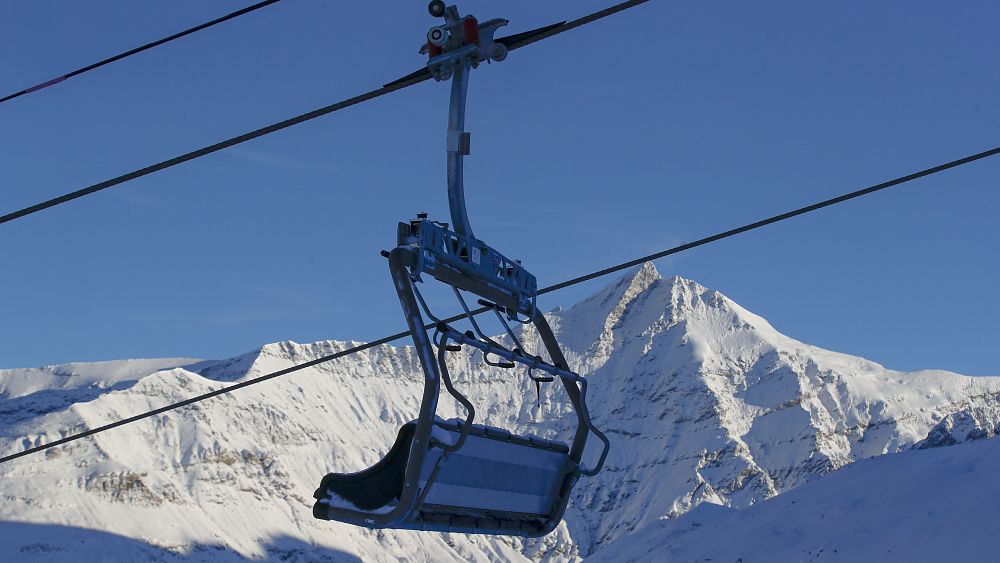
French ski resorts are calling on the government to give them better clarity for the coming season after COVID-19 measures saw them lose billions during the previous winter.
Ski professionals are currently in the midst of preparing for the season and recruiting seasonal workers and have warned that a roll-out of the COVID health pass at resorts would be “unmanageable”.
French resorts suffered greatly during the previous winter season after the government decided to keep ski lifts closed in an effort to curb the spread of the disease following an autumnal surge in infections and deaths.
Alex Maulin, president of Domaines Skiables de France (DSF), which represents the operators of 250 French ski resorts, described it as “a horrible year: a blank season, a black year”.
The government has so far not revealed what COVID-19 measures resorts may have to follow. Jean-Baptiste Lemoyne, Secretary of State for Tourism has sought to soothe professionals, affirming: “the message is very clear: This winter, we will ski!”
“We have to go all out and we’ll have a good season. There is a desire for the great outdoors, and this is an opportunity to win back certain clients who have moved away from skiing, particularly in France,” he said.
But, he conceded that the spectre of the health pass looms large as the government said earlier this week that it intends to preserve “the possibility” of using it until summer 2022.
This will allow the country to keep a tool “to be triggered just in case” of an epidemic surge, he explained. In any case, “at this stage, the law does not provide for the health pass to be requested in ski lifts, so I believe that we must now be part of this framework”.
The COVID-19 health pass, attesting its holder has either been fully vaccinated, has tested negative recently or has recovered from the disease over the previous six months, was first rolled out across France in late July.
It is currently required to visit bars, restaurants, cultural and leisure venues, to attend large events or to use long-distance public transport. The current legislation has planned for its use until November 15, with lawmakers insisting any extension be first approved by them.
‘Terrible’ damage
“We would have liked (to be informed) earlier. Last year we had repeated postponements of opening and we are afraid that it will happen again,” the manager of a small resort in Alpes de Haute-Provence, said on Thursday.
Especially because bookings, including from foreign clientele, already point to a decent season.
“We launched the sales of ski passes in May. It’s a hit, people really want to come and ski,” Yves Dimier, former champion and director of the Val-Cenis resort, in Savoie, said.
“We know that all the indicators are green but we have been scalded over the last two years. Overall, the season looks good, let’s wait and see”, he concluded.
The government ended up helping ski professionals weather the COVID-19 storm to the tune of €6 billion last year, including a €650 million diversification plan.
But many ski professionals, however, believe the government initially largely underestimated the cost of its decisions for the sector.
“The economic damage has been terrible. (…) This year, (French President) Emmanuel Macron will know that a closure is measured in billions and not in millions,” Laurent Vanat, a specialist consultant based in Geneva, said.
Laurent Wauquiez, president of the Auvergne-Rhône-Alpes region. estimate that the repeated postponements and the decision to close ski lifts “cost our country 8 billion euros and have weakened 400,000 jobs.”
For Vanat, it is no coincidence that only France, Italy and Germany have taken the decision to close their ski lifts: “All three are countries where the governments are very far from the mountains and do not perceive all the stakes”.
Since mid-September, the number of new infections across France has fallen under 10,000 a day and fatalities are counted by the dozens, rather than the hundreds observed daily over the winter months.
Yet, the country had similar figures at the same period last year before an autumnal surge, blamed on relaxed COVID measures and the emergence of variants.
However, after a slow start, vaccination across France has accelerated with more than 75% of the country’s population now fully inoculated.